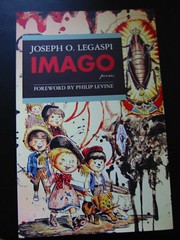It's a strange thing when you know someone for a long time and they write a deeply personal book. I mean, I've known Joseph for . . . seventeen years. Sheesh! Has it really been that long?
We met at Loyola Marymount, our undergraduate alma mater. He was an English major and I was still a Biology major (I'd later decide to declare a double major). He was always the artist and writer, from what I remember in our classes together. My very first poetry workshop was a 500 level class . . . a grad class . . . and Joseph was there, supportive as ever. He wrote an amazing Icarus poem and I remember how awestruck (and jealous) I was. When he went on to NYU, he was giving me advice when I was applying to MFA programs. He's basically been like my brother for many years.
Now I'm realizing how little I knew Joseph--how honest and naked he has rendered himself with the publication of his first book, Imago. The book is seeringly violent, beautiful, and melancholy. I was quite surprised by the tone of it, knowing Joseph as the man who's always laughing, teasing, and smiling.
Anyway, pick up this book. You must.
5 days ago



5 comments:
ah, you beat me to it. i was going to blog about it (and still am)...it was all i could talk about for 2 days. ask D.
loving this book too, and loving the experience of reading it.
love the cover. . . what's it about? can you give me a little to chew before I decide?
Thanks for posting about this, Oliver. I can't wait to read it. & by the way, I enjoyed your poetry/talk of poetry over the last few weeks.
Hi Miguel,
Barb has an excellent review over on her blog, if you're curious. She does a very nice job of talking about Joseph's book within the larger framework of Asian American masculinitiy.
The speaker in Imago is negotiating with his burgeoning sexuality as well as the markers or tags assigned to a masculine society. The father in the book is violent, alcoholic, and abusive, and it's clear that Legaspi's speaker takes him on as a model as a young man, but as the speaker becomes aware of his sexual identity, he revises his aspirations. In his poem, "Nocturnal," Legaspi writes, "And in my sleep, I loved women/ and men; I saw men love women;/ a swirling bestiary, all the carnal knowledge I knew . . .." Later in the same poem, in an homage to Robert Hayden's "Those Winter Sundays", Legaspi writes "What did I know? What have I to say/ of the savagery and tenderness of love?"
If you want to know what the book is about . . . there it is.
Post a Comment